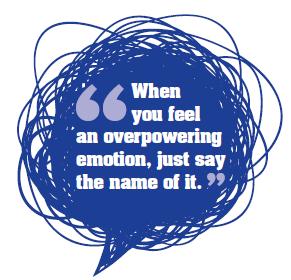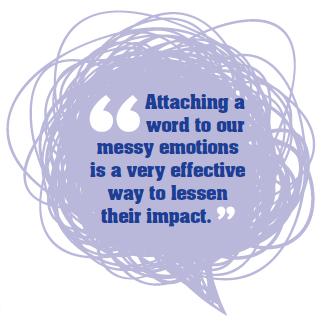34
Take Part in Name Calling
“The beginning of wisdom is to call things by their own names.”
Chinese Proverb
“You need to get in touch with your emotions” is a phrase you hear a lot these days, in relation to growing as a person.
But do you need to get in touch with them?
There are lots of emotions I don't want to get in touch with: intimidated, scared, insecure, lonely, unhappy, angry, upset, sad, patronized, humiliated … I could go on about the appointment with my doctor, but I won't.
The fact is there are a lot of emotions that can have quite an overpowering effect on us. But our emotions are there to help us. We need our feelings to signal to us about the dangers and opportunities that we face from within and without. But when our emotions get too strong they just take over and we can't function properly.
But there is a simple technique that can really help to diffuse negative emotions. Name them. I don't mean give each emotion its own pet name: “This is my insecurity, but I call it ‘Norman'”. No, what I mean is when you feel an overpowering emotion, just say the name of it.

Obviously if you're in the company of someone you say it in your head, but if you're alone, saying it out loud can give it more authority.
For instance if someone says they don't like what you're wearing, you might say “humiliated”, or if some one cuts you up when you're driving, you might say “angry”.

Now this isn't just some new age mumbo jumbo; there is some real science behind it. Recently, researchers discovered that attaching a word to our messy emotions is a very effective way to lessen their impact. In a series of studies by UCLA psychologist Matthew D. Lieberman, participants who attached labels to emotions like “anger” or “fear” had less activity in the amygdala, the part of the brain that governs our fight-or-flight response. But these individuals also had more activity in the right ventrolateral prefrontal cortex, or the thinking part of the brain.
Labelling their feelings shifted them from an emotional state to a thinking state. Suddenly your mind is changing its focus from the emotion “anger” to the word “anger”.
Lieberman explained: “In the same way you hit the brake when you're driving when you see a yellow light, when you put feelings into words, you seem to be hitting the brakes on your emotional responses.”
Another study on whether naming can help reduce negative emotions was run at UCLA by Dr Katerina Kircanski and her colleagues.
They wanted to discover whether people's use of language could help treat phobias and irrational fears of things. For their test, they used a fear of spiders.
They divided the 88 participants into three groups. The first group had to verbally label their negative emotion (affect labelling). The second group had to substitute neutral phrases about their negative experience (reappraisal), and the third to make up a sentence about an unrelated familiar object (distraction).
They measured the results in two ways. The first was skin conductance (the skin momentarily becomes a better conductor of electricity when either external or internal stimuli occur that are physiologically arousing). The second measure was simply for the participants to self-report their fear on a scale of zero to a hundred from “no fear” to “extreme fear”.
When it came to personally reporting how the participants felt there was very little difference in the three groups. But in the physiological test, the group that verbalized their fear showed the greatest reduction in skin conductance response. Dr Kircanski said it might be because individuals don't expect to feel less fear from labelling a negative emotion.
Of course your feelings won't disappear, and you don't want them to. They play an important role in helping us understand and cope with people, situations and experiences. But just naming the feeling can help soothe negative emotions and stop us responding impulsively, drowning in negative feelings, or becoming aggressive in a counter-productive way.
You and I
I'd just been writing this in my office at home in the evening. I'd gone out to have some dinner and when I came back into the office, I switched on the light and saw a big spider on the wall. I didn't say “scared” under my breath as I'm not scared of spiders. But it was very strange. I expected to turn round and see a researcher in a white coat, standing in the corner of the room with a clipboard.
But if I was scared of spiders, I would be better off saying to myself “You shouldn't let it get to you” rather than “I won't let it get to me.”
This is the next finding in my “talking-to yourself” research.
When you give yourself motivational speeches in your head (and 96% of adults do), it will lead to better performance if you use “you” rather than “I”. So instead of saying to yourself “I can do it”, you should say “You can do it.”
Sanda Dolcos at the University of Illinois at Urbana–Champaign and Dolores Albarracin at the University of Pennsylvania conducted a series of experiments on the subject.
In the first experiment, they had 95 undergraduates imagine they were a character in a sketch, and that character was facing a choice. They were asked to write down the advice they would give themselves in making this choice, and half were told to use “I” in their instructions while the other half were told to use “you.”
Afterward, the participants were asked to complete anagrams. Those who had used “you” in their advice to their character completed more anagrams than those who had used “I”.

They also ran a test where they asked 135 psychology students to write down advice to themselves about exercising for the next two weeks. The ones using “you” in their advice planned to do more exercise during those two weeks and also reported more positive attitudes toward it than the students giving themselves first-person advice.
In another study, conducted by University of Michigan's Ethan Kross, participants were told they had to give a speech to a panel of judges on why they were qualified for their dream job. And they had to give it in five minutes without notes.
In the study they found that those who worked through their stress about giving a speech using “you” rather than “I” performed better and were less bothered by anxieties. When people use the second-person pronoun “it allows them to give themselves objective, helpful feedback”, said Ethan Kross.
So what's behind the “you” effect? The researchers speculated that second-person self-talk may have this beneficial effect because it cues memories of receiving support and encouragement from others, especially in childhood.
I think when you say “I”, it's more of a challenge to yourself, whereas when you say “you”, it's much more supportive and much more likely to instill confidence.
Time to Talk It Out
Have you ever found yourself walking down the aisles in a supermarket, looking for a particular item and then muttering the name of the product at the same time? Well, whatever the other shoppers thought of you, you were actually using a very helpful cognitive tool.
Past research has shown that self-directed speech can help guide behaviours for children, such as tying shoelaces or other step-by-step tasks. But Gary Lupyan and Daniel Swingley from the University of Wisconsin have found the same can be true for adults.
As long as you know what an object looks like, if you say its name out loud, you can speed up the process of finding it.
In one experiment, volunteers were shown 20 pictures of various objects and asked to look for a specific one, such as a banana. In half of the trials, participants were asked to repeatedly say what they were looking for out loud to themselves; in the others, they were asked to remain silent.
The researchers found self-directed speech helped people find objects more quickly by about a tenth of a second, which might not sound like much, but it is when you see it as a percentage of the average time it took participants to find an item, which was 1.2 to 2 seconds.
“The general take-home point is that language is not just a system of communication, but I'm arguing it can augment perception, augment thinking,” Lupyan told Livescience.
The benefits lie much further than finding fruit in the supermarket or cheese in your fridge. Speaking helps any search, particularly when there is a strong association between the name and the look of an object. If you're organizing elements for a project or presentation, or looking for documents on your computer, try naming the items out loud and it should help speed up the process and use up less mental energy.
